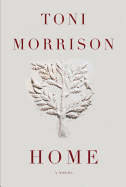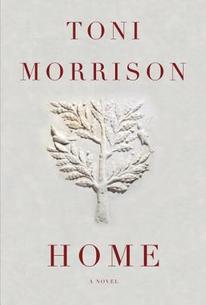
 Toni Morrison's Home continues her trend toward creating shorter works that do not reduce intensity for the sake of brevity. Though Home has been published as a novel, it is in fact a masterfully written novella that uses alternating points of view, swift characterization-by-action and metaphorical symmetry with a compression which is simultaneously a tour de force and a tantalization. The real-time action of Home--Frank Money’s quest to overcome his post-Korean War trauma and confront the Georgia of his childhood in order to rescue his sister from mortal peril--is easily dramatized within the short form. What threatens to overwhelm the novella’s shape is the extreme emotional density of Home’s first and concluding chapters. The central storyline bends downward at both ends under their retrospective weight, and their impact is encapsulated rather than amplified--yet all of the information in these passages is integral to the narrative of Frank’s psychological journey.
Toni Morrison's Home continues her trend toward creating shorter works that do not reduce intensity for the sake of brevity. Though Home has been published as a novel, it is in fact a masterfully written novella that uses alternating points of view, swift characterization-by-action and metaphorical symmetry with a compression which is simultaneously a tour de force and a tantalization. The real-time action of Home--Frank Money’s quest to overcome his post-Korean War trauma and confront the Georgia of his childhood in order to rescue his sister from mortal peril--is easily dramatized within the short form. What threatens to overwhelm the novella’s shape is the extreme emotional density of Home’s first and concluding chapters. The central storyline bends downward at both ends under their retrospective weight, and their impact is encapsulated rather than amplified--yet all of the information in these passages is integral to the narrative of Frank’s psychological journey.
The prose in Home is stunning, and the novella's only flat notes occur in the dialogue of some one-dimensional minor characters who appear in the early stages of Frank's travels. The novella opens with a near prose-poem set in italics in which Frank recounts a memory of protecting "Cee" (short for Ycidra) when they were kids in Lotus, Georgia, a town he hoped never to see again after he enlisted. This first-person beginning sets up Home's ingenious voice relay. In the italicized chapters, the protagonist confides in the author and sometimes argues with her about how she presents his story. These italicized "I" chapters alternate with third-person chapters that dramatize Frank's quest from a storytelling perspective; Morrison also interjects three singular authorial chapters dedicated to the significant women in Frank's life. In the penultimate chapter, the novella's point-of-view elevates all the way to a resounding omniscience; it concludes with a poem written in Frank's "I" voice. Regardless of narrator, the vividness of the chapters and their concise accumulation of experiences give Home a broader scope than would seem possible in so few pages.
Morrison unleashes her most lyrical language upon the foreshadowing and depiction of Home's most brutal events. Her technique is indelible, but without the broader context of a longer work, the effect is more head-snapping than reverberating. Maybe Morrison intended for the reader to be whiplashed rather than coddled into understanding, but it seems a waste compared to the deeply penetrating effect of her longer works. Home is not a text of defeat, at any length, yet even a stalwart reader may not be able to absorb its quantities of pain in the space of a reading experience that endures but a single evening. Any fan of Morrison's will find much to appreciate and learn from in Home, but they may also finish it yearning for the amplitude of her earlier novels. --Holloway McCandless, blogger at Litagogo: A Guide to Free Literary Podcasts
Shelf Talker: A masterful and intense novella from an American Nobel laureate about a Korean War veteran's quest to rescue his sister and reconcile his tormented sense of home.

